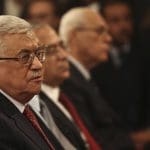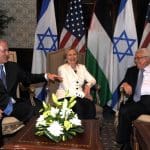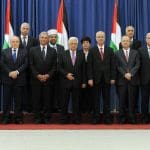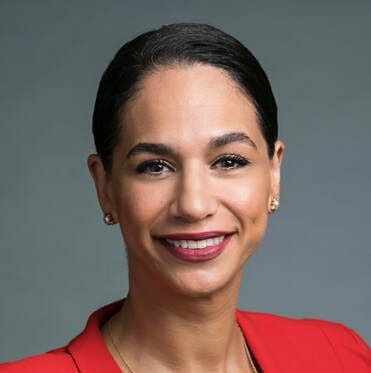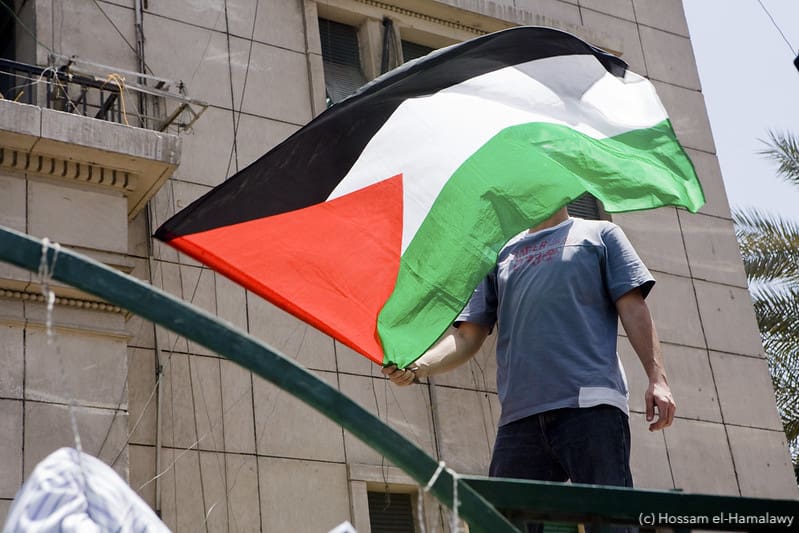
Overview
This Al-Shabaka roundtable was developed in response to Noura Erakat’s policy brief “Beyond Sterile Negotiations: Looking for a Leadership with a Strategy.” Al-Shabaka Policy Advisors as well as guest contributor Loubna Qutami reflect on the Boycott National Committee (BNC), the questions of representation and self-determination, the colonial condition, and the future of the struggle. Haidar Eid opens by critiquing Noura’s oversight of the important role played by the Islamic movements in the BNC’s secretariat. He also criticizes the failure of the BNC to speak out against those policies of the Palestine Liberation Organization (PLO) that diverge with BNC principles, such as the decision to participate in the recent Amman negotiations. Samah Sabawi argues that the Palestinian aspiration for self-determination can still be achieved within the context of the BDS call, noting that self-determination does not offer a specific political program and does not dictate a final outcome. In contrast, Loubna Qutami argues that the dilemmas of the struggle that entrap the Palestinian people are largely due to the inability to re-conceptualize the history that has brought them to this point. It is through a study of history “that we can understand how and why our liberation struggle has been co-opted, hi-jacked, decimated, and reduced to debates on legitimate leadership, and negotiations over territory amounting to only a fraction of historic Palestine and excluding the vast majority of the Palestinian people”.
In her response, Noura Erakat suggests that her respondents have misunderstood her brief and have not addressed her concerns. These concerns relate to the fragmentation of the Palestinian national body and the failure to articulate a political vision for a solution. She argues that Palestinians should adopt a one-state solution as a political vision that aims for the equality of all persons irrespective of nationality, ethnicity, religion, or race.
Haidar Eid
There is no doubt that Noura Erakat’s brief encourages deep, critical, and constructive thinking towards the right-wing secular Palestinian leadership. She also tackles the Boycott National Committee’s (BNC) lack of a political program. Noura addresses the various movements in the Diaspora that are attempting to fill the void left by the absence of the Palestine Liberation Organization (PLO) and its absorption into the inferior and formless Palestinian National Authority (PNA). I agree with this description. However, Noura’s brief avoids a discussion of the emergence of the Islamic movement represented by Hamas and its outstanding electoral performance! The article does not attempt to explain the reasons driving the growth of this movement although it is represented in the BNC’s secretariat within the national and Islamic action committee. Noura completely ignores this subject despite its utmost importance to the struggle.
Noura’s article opens by objecting to the return to negotiations, or what I would call the “Oslo revival” by highlighting the PNA’s compliance with the Quartet’s demand, which was unequivocally biased towards Israel, since Israel never fulfilled its obligation to halt settlement activity. Her critique is part of a common trend in which the year 1993 pops up at the beginning of a cumulative process that eventually led to our situation today.
For the sake of self-criticism, which we, as boycott activists ought to exercise, and with regard to the questions Noura poses, can we say that the Amman meeting between Israel and the PLO/PNA was an attempt to remarket the Oslo Accords in a new guise? Is that considered ‘normalization’ according to the nationally agreed upon definition of normalization, drafted by the BNC? Why does the BNC avoid taking a clear stand on these futile negotiations that literally contradict all that the BNC stands for? How does the BNC call on others not to normalize when it simultaneously avoids taking a clear confrontational stance against a return to negotiations by the PNA? Is the PNA not an embodiment of normalization? Is this the price for preserving the political movement to which the negotiators belong to within the framework of the BNC? Doesn’t the return to negotiations contradict the very advanced official stand that Fatah expressed two weeks ago in a clear statement of its position on normalization? Which is Fatah’s position? Is it the position expressed by the Central Committee members who went to Amman or is it the position of its representative in the BNC?
Noura refers to tensions arising from the BNC’s lack of a political program and its focus on a rights-based approach. This issue is certainly worthy of discussion within the BNC’s secretariat. However, Noura, surprisingly, separates the Diaspora coalitions from the rest of the BNC, neglecting to mention the fact that the latter coalition is the frame of reference for international boycott movements. She also hints, albeit unintentionally, that there is tension between the “inside and the outside” on the BNC. I believe that a good comparison with the South African experience can be made, which overlooked the role of the United Democratic Front (UDF) that functioned with representation from the National Congress Party, as well as other political parties and civil society organizations in exactly the same manner as the BNC. The UDF adopted two out of four major avenues of struggle, namely mass mobilization and the boycott campaign. History stands witness to this approach that contributed immensely to ending apartheid. In my opinion, the BNC has learnt this historical lesson from South Africa.
Samah Sabawi
Noura Erakat’s thought provoking article raises many questions that Palestinians need to address in these crucial times. And while I agree with the general premise of her article highlighting the need to have a Palestinian leadership that represents the hopes and aspirations of all Palestinians inside historic Palestine and in the diaspora, I have some concerns with some of the arguments made regarding self determination, the BNC’s role, and the benefits of a rights-based approach to the Palestinian struggle.
I would argue that the Palestinian aspiration for self-determination can still be achieved within the context of the BDS call. Self-determination is a principle of international law, which means that nations have the right to choose their political status and declare their sovereignty without external interference. However, it is important to recognize that this principle does not offer a specific political program and it does not dictate a final outcome. It is for this reason that self-determination can be applied within an autonomous Palestinian state, within a federation, within a bi-national state, or within one state. In fact, the vagueness of the application of the principle of self-determination has not been lost on the PA, as it continues to use it in its rhetoric while negotiating with Israel over a demilitarized, non-contiguous state of Palestine that has been likened by many to the Bantustans in apartheid South Africa (which were also justified by reference to the language of self-determination). So it is crucial to be aware that when we speak of self-determination we are speaking of a principle that needs to be clearly defined within a Palestinian context so as to leave no room for the current ambiguity, which may cost the Palestinians their rights and freedoms. The BDS call does just that. It offers a more clearly defined platform guaranteeing Palestinian rights, freedom, and equality while it does not infringe upon the general principle of self determination.
Erakat criticizes the BNC for not claiming a mandate equivalent to that of the PLO but I see this as a strategic move by the BNC, which by steering away from traditional power struggles that have stifled Palestinian liberation efforts, has ensured a unified Palestinian resistance against Israel and put the liberation movement back on track. I agree with her assumption the BDS enables solidarity groups to ‘promote a rights based advocacy’ without giving them accountability for the political outcome of their advocacy, but I believe that is precisely the role that solidarity groups should have. The political outcome of any liberation movement should not be determined by external solidarity, rather it should be born out of the resistance of the people involved in the struggle.
Finally, it must be said that while a rights-based approach may not present a clearly defined political program, within the Israeli-Palestinian context, this flexibility is needed to put the focus back to where it needs to be, on Israel’s gross violations of Palestinian rights. Ensuring that the language of universal rights, justice, equality, and freedom are at the foundation of the movement will act like a compass to guide us through to what can be an ideal political outcome.
Loubna Qutami
The questions raised in Noura’s brief, while legitimate, predominantly address the rising voices of dissent within new transnational networks and bodies that do or do not claim to “represent” the Palestinian people. Instead of focusing on these initiatives and networks, I find it more fruitful to focus on an increasingly common ‘current’ within the Palestinian political scene regarding a prospective Palestinian liberation movement. In my opinion, this current risks sidetracking the Palestinian cause and characterizing it within a faulty paradigm. It posits a spontaneous political phenomenon of international solidarity and a re-awakening of the Palestinian masses that have ‘suddenly’ realized that representation, or the perceived lack thereof, is our main problem. My approach to addressing these questions is largely inspired by a lecture given by Dr. Seif Dana at the Palestinian Youth Movement’s 2011 International Summer School.
The way we have come to understand our current reality, the failure of the Palestinian liberation project, and the current political dilemmas of the struggle that entrap our people, are largely due to our inability to re-conceptualize the history that has brought us to this point. I have full admiration for Noura, a mentor of mine, and the way she has identified and contextualized the discourses of different political actors in transnational Palestinian politics. But I believe that the roots of our political conundrum lie elsewhere, as I discuss below. By confronting these issues – both as intellectuals and as a young generation committed to liberation and justice – we assume a sense of responsibility and avoid being sidetracked by the blurred lens through which we see our own struggle and history.
1) Our Colonial Condition: As a young generation, we must recognize that our condition is the result and continuation of a history that has predated us and that has set the foundation for the political climate that we find ourselves in today. It is through this study of history that we can understand how and why our liberation struggle has been co-opted, hi-jacked, decimated, and reduced to debates on legitimate leadership, representation, and negotiations over territory amounting to only a fraction of historic Palestine and excluding the vast majority of the Palestinian people. To put it simply, we have to look at our struggle in a broader political perspective through a more refined analysis of our history in order to understand the ultimate rupture of the Palestinian liberation project. If we understand that our history precedes our current reality, temporal solutions and analysis do not bear as much of a risk of being short-sighted and negligent.
2) On Representation: Since 2006, we have seen a wave of new bodies and networks rising to challenge the deadlocked failure of the official Palestinian leadership’s representation of our people’s dire needs and national aspirations. These initiatives, without careful examination about what a re-vitalized movement would in fact mean for our people, are likely to further polarize the Palestinian people into believing that our political predicament is wholly rooted and entrenched in the power of certain individuals within the Palestinian leadership. With this in mind, concepts of legitimacy, credibility, and representation actually further fragment the Palestinian people. As they are currently used, “unity,” “reconciliation,” and “representation” are only words rather than the unified principles that are necessary for our struggle and movement.
3) Rights-Based Approach: Palestinians in the diaspora have been focusing on human rights and advocacy as the only alternative to overcoming our concerns with representation, legitimacy, and resolving our physical distance from Palestine. The simplicity of the rights based framework is tangible, real, popular, acceptable, and becoming increasingly normal in our diaspora societies. However, this herds the rising waves of young active Palestinians into previously established frameworks of working for Palestine that adopt Western hegemonic paradigms of how we should see our own struggle; through the subjectivity of an outsider in solidarity with Palestinians. This subjectivity prevents us, as a new generation, from envisioning what a transnational liberation movement might look like in theory, and in practice.
4) The Liberation Project: We need a discourse that does not conflate our quest for legitimacy with our determination for freedom; confuse our tools for advocacy with our goals of revolution, or blame our internal political conundrum as the main reason for our peoples’ suffering. It is only through the Palestinian people, whatever faction they belong to, old or new, that we can establish a political liberation project that takes into account our people’s aspirations, strengths, vulnerabilities, and current realities. When we can (re) establish, (re) organize and (re) vitalize a centralized transnational liberation project; all other topics are trivial.
Noura Erakat
I am invigorated by this discussion and understand the critique of my brief as the tip of an iceberg of the conversations we are not having with one another. For better or worse, my esteemed respondents do not respond to my concerns, which I address below. I have limited space to address these themes thoroughly here, though I will elaborate at greater length in a forthcoming and separate piece.
My primary concern is that especially since the advent of the peace process, the Palestinian national body has been systematically fragmented and the movement for self-determination has lacked a political vision for a solution. This has produced several conditions including the creation of distinct and disparate grievances and vested interests among the Palestinian national body based upon their geographic and civic status.
Consider that Palestinian grievances are contingent on their geographic location (i.e., Gaza, West Bank, East Jerusalem, Israel, Arab world, and beyond) and political status (i.e., second-class citizens, residents, civilians under occupation, refugees, and citizens of other nations). These distinctions have stunted collective action among the Palestinian national body as a whole. Consider, however, that while local conditions have engendered localized grievances, they have been meted out to each community precisely because of their Palestinian nationality. Even in the case where Palestinian populations suffer from similar conditions, they have been unable to organize collectively, fragmented as they are by borders and identity cards.
Geographic and civic fragmentation has also produced distinct vested interests based on financial and political benefits accrued by the peace process industry and the state-building project thus impeding collective action. Consider that within Gaza there exist hundreds of new millionaires who have profited from the tunnel industry and by extension the blockade. Within Area A, Palestinian businessmen are making quite a profit from new developments in our statelets where they can control the economy, primarily in the form of real estate.
Together, distinct grievances and distinct vested interests, have impeded the ability for the Palestinian nation to envision and articulate a political vision underpinned with a national liberation strategy. This has produced a vacuum that has been filled by disconnected diaspora and transnational movements working towards treating the fragmentation of the Palestinian national body on the one hand and a global human rights movement built on a tactic of boycott, divestment, and sanctions aimed at imposing pressure on Apartheid Israel. While the former effort is admirable, its nascent condition and limited reach indicates the handicap of diaspora movements to treat national fragmentation from the outside in. As for the latter, while the Boycott National Committee is at present the most “representative” Palestinian body, the fact that it has rights-based rather than solutions-based goals means that it cannot be a forum for Palestinians to discuss, debate, and articulate a political vision for Palestinian self-determination. Accordingly:
1) Representation is not the solution. Achieving a representative body will only help to overcome the challenge of collective action but is not sufficient for mobilization. The problem is the lack of a political program, not the lack of a representative body. Given distinct grievances among Palestinians, accountable representation is necessary to register the grievances among the Palestinian national body including the lack of accountability for war crimes committed in Gaza during Operation Cast Lead as well as an ongoing blockade and naval siege for its fifth year in 2012; second-class status as Israeli citizens within Israel resulting in institutionalized discrimination in housing, education, and employment; forced exile of Palestinian refugees and the lack of protection for said refugees in their host countries throughout the Arab world; and the ongoing confiscation of Palestinian lands, home demolitions, and violence meted out by Jewish colonial-settlers and the Israeli Occupation Forces against the Palestinian civilians in the West Bank.
The common condition of all Palestinians throughout pre-1967 Israel, the Occupied Territory, and beyond, is one of forced population transfer, better known as ethnic cleansing. A policy of removing Palestinians from their lands and settling Jewish nationals and/or planting trees in their place is common to all Palestinians regardless of their geographic or civic status. Consider the forced population transfer of Palestinians within Israel, in the Galilee and the Negev; in the West Bank, in East Jerusalem, Area C, and the Jordan Valley; and in exile, of refugees. Based on this common condition, the Palestinian national body can articulate a political program from within Israel throughout the OPT and the global diaspora aimed at challenging their ongoing and systemic ethnic cleansing. Articulating a political solution that thwarts this process amounts to a political vision that I contend is currently missing.
2) Our colonial condition offers the source of our problems but does not offer the solution. Loubna Qatami, a leader in her own right, describes that our delusion lies in our lack of a historical analysis but I disagree. To the contrary, for most cross-sections of our movement, our overemphasis on our past has blurred our ability to envision a future. Instead of imagining new horizons and ways of organizing ourselves we have romanticized the past and equated our self-determination with a reversion to our previous condition. I do not think that is (1) what we need; nor (2) what affords the most adequate remedy to our colonial condition. At this historical juncture of prolonged military occupation in the OPT and institutionalized discrimination within Israel that distinguishes between Jewish nationals and non-Jewish nationals, a condition of Apartheid exists throughout Israel and the OPT. Accordingly, arguing for a return to the status quo ante before the beginning of Zionist colonization will not be sufficient to redress Palestinian national grievances. Instead I believe that a movement aimed at challenging a two-tiered system that privileges Jewish nationals and abridges the rights of non-Jewish Arab Palestinians is more appropriate.
3) A rights-based approach indeed provides a compass but does not provide a destination. Sameh Sabawi and Haidar Eid misunderstand my criticism—I do not fault the BNC for failing to claim the platform of a national representative body. Instead, I assert that despite the BNC’s adoption of a rights-based program and not one that is solution-based, many cross-sections of the solidarity movement have nonetheless ascribed to it political agency that it explicitly refutes. The BNC’s support of a human rights agenda may suffice for solidarity movements, but it certainly does not for Palestinians who need a political vision and goals. Though a rights-based approach can act as a compass, it does not provide a destination. I am mostly concerned with that destination in my brief.
Perhaps we, as Palestinians, overwhelmingly lament our grievances because there is less risk of being chastised by identifying what afflicts our national condition as opposed to identifying its optimal treatment. At the high risk of subjecting myself to such harsh critique, I propose that:
1) Collectively, or severally, representative Palestinian body/ies, should identify an ongoing process of forced population transfer, or ethnic cleansing as the common condition to all Palestinians regardless of their geographic location or political status. This ethnic cleansing is based upon the distinction between Jewish nationals and non-Jewish Arab Palestinians that does not distinguish between Palestinian citizens of Israel, residents of East Jerusalem, civilians in Gaza and the West Bank, or refugees in forced exile. This institutionalized discrimination, colored by separation and domination, is tantamount to Apartheid throughout Israel and the OPT.
2) To comprehensively treat this condition, Palestinians should adopt a one-state solution as a political vision that aims for the equality of all persons irrespective of nationality, ethnicity, religion, or race. By endorsing a one-state solution, we are calling for the dismantlement of an institutionalized racism that privileges Jewish nationals above their non-Jewish Arab Palestinian counterparts rather than supporting the creation of two ethnically homogenous states. In a sense, this vision sacrifices nationalism for a more liberal concept of equality and democratic pluralism. The one-state solution redefines the historic conception of self-determination from self-rule within a nation-state to a mutually inclusive concept that does not necessitate national homogeneity. In effect, Palestinians must accept the permanent presence of Israeli nationals in Mandate Palestine and the simultaneous removal of its Zionist identity and constitution. In this state, Palestinian self-determination will not result in immediate self-governance but rather the equal opportunity to rule ourselves and to determine our national destiny alongside our diverse counterparts.
This does not address the question of “how” nor deal with the steps necessary to redress the violence, loss, and dispossession wrought by 64 years of settler-colonization. That is the topic for another article.










